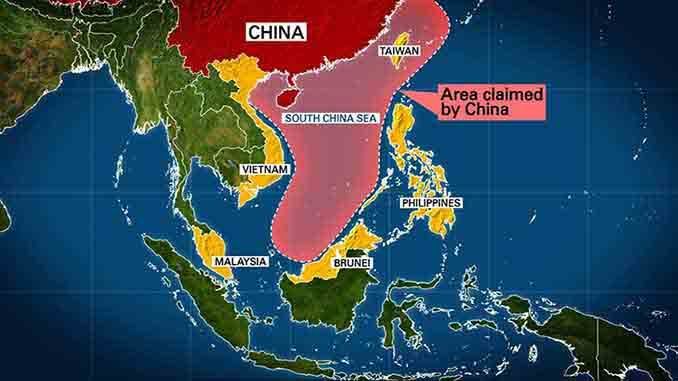The Supreme Court verdict came 15 years late. Still, its voiding of the unconstitutional 2005 Joint Marine Seismic Undertaking is salient. Observations are confirmed that then-president Gloria Arroyo had emboldened Chinese aggression in the Philippines’ 200-mile exclusive economic zone.
Caution also is served on President Ferdinand Marcos Jr. against rushing into joint petroleum exploration with China in Philippine maritime jurisdiction.
In 2005, JMSU let state-owned China National Offshore Oil Corp. explore 142,886 square kilometers of western Philippine EEZ. It illegally claimed the EEZ as part of its internal waters.
Vietnam Oil and Gas Corp. partnered as one-third of the venture. Last third was Philippine National Oil Co. One-sixth of the survey area, about 24,000 square kilometers, was within Palawan Sea — Philippine territory.
Malacañang hid the deal from Congress and the public. It was uncovered only in 2008. By then, the Philippines already had spent US$16 million as project share.
Journalist Barry Wain exposed JMSU in Far Eastern Economic Review, Jan-Feb 2008. He noted that Manila at first led ASEAN to make China sign the 2002 Declaration of Conduct in South China Sea. The DOC enjoined China to stop confrontational expansion of its occupied reefs. Yet with JMSU, Manila broke ranks from its allies and let Beijing explore the Philippine seabed.
Wain wrote that the edge of JMSU exploration was only 25 kilometers from Palawan’s southern town of Balabac — intruding Philippine territory.
At that time Congress was investigating three Chinese deals. One was the US$329-million National Broadband Network of ZTE Corp. Exposed in Gotcha and attested by whistleblowers at the Senate, it contained a US$200-million (PhP10-billion) kickback.
Another was an illegal grant to newborn subsidiary ZTE International of gold mining rights in Mount Diwalwal and North Davao. Third was the participation of China State Grid, contrary to announced policy, in the Transmission Company’s privatization.
JMSU came in two phases, the first in 2005-2008. Exposed in 2008, Malacañang withdrew from the second phase, 2008-2010.
China used Malacañang’s withdrawal to withhold all exploration findings from the Philippines. Armed with the data, China in 2009 unilaterally filed with the UN a nine-dash line claim over the entire SCS.
Before JMSU, the Arroyo admin showed subservience to Beijing. On the Chinese embassy’s demand, Malacañang would release Hainan poachers arrested in the EEZ. Once, hundreds of Palawan citizens sat on the airport runway to prevent repatriation of poachers with pending court cases.
Seven congressmen led by Satur Ocampo and Teddy Casiño petitioned SC in 2008 to nullify JMSU. The SC opined JMSU broke the Constitution in allowing foreigners to dominate the exploration.
Article XII National Economy and Patrimony, Section 2, limits such activities to Filipino citizens or corporations at least sixty-percent Filipino-owned.
Further: “Exploration, development, and utilization of natural resources shall be under full control and supervision of the State.
“The President may enter into agreements with foreign-owned corporations involving either technical or financial assistance for large-scale exploration, development, and utilization of minerals, petroleum, and other mineral oils.
“The President shall notify Congress of every contract entered into in accordance with this provision, within thirty days from its execution.”
Senators denounced Arroyo for not informing them of JMSU. Also, for spending US$16 million without congressional consent.
Starting 2018, President Rody Duterte negotiated joint oil and gas development with China in Recto Bank. Talks collapsed last June due to China’s insistence on its laws to govern the Philippine EEZ.
Last week Chinese President Xi Jinping egged visiting Marcos Jr. to resume talks.
Casiño said Tuesday: “May this [SC ruling] be a warning to Marcos Jr. not to trifle with the constitutional provisions that reserve the exploitation of our natural resources exclusively to Filipinos and under the full supervision and control of the Philippine government.”
Excerpts from Gotcha 10, 12, 14 Mar. 2008:
Arroyo rushed to Beijing on Sept. 1, 2004, to oversee the signing of an “Agreement for Joint Marine Seismic Undertaking in Certain Areas in [SCS].” RP and China couched the pact in vague diplomatese. Eg., “turn an area of potential conflict into a zone of cooperation.”
Vietnam got wind of the inclusion of its own Spratly claims in the area, and protested. As appeasement, RP and China let Vietnam in on the deal. A sequel “Tripartite Agreement for Joint Marine Scientific Research in Certain Areas in [SCS]” was signed on Mar. 14, 2005.
Invoking the pact, China resists drilling in Palawan by Filipino firms that were granted survey rights well before the 2004 or 2005 signings. Drilling in RP waters provokes the Chinese Navy to steam in and enforce “joint rights” over the area.
The 2004 RP-China pact originally was billed “joint exploration.” Then-presidential legal counsel Merceditas Gutierrez found it unconstitutional. It was changed to “An Agreement for Joint Marine Seismic Undertaking in Certain Areas of [SCS].”
“Seismic” still pertains to exploration, which the Charter forbids unless under stringent conditions. When Vietnam was included in 2005, a “cure” was proposed thus: “A Tripartite Agreement for Joint Scientific Research in Certain Areas of [SCS].” But the signed version still had the revealing title, “A Tripartite Agreement for Joint Marine Seismic Undertaking.”
Jarius Bondoc is an award-winning Filipino journalist and author based in Manila. He writes opinion pieces for The Philippine Star and Pilipino Star Ngayon and hosts a radio program on DWIZ 882 every Saturday. Catch Sapol radio show, Saturdays, 8 to 10 a.m., DWIZ (882-AM).
The views expressed in this article are the opinions of the author and do not necessarily reflect the editorial stance of LiCAS.news.









